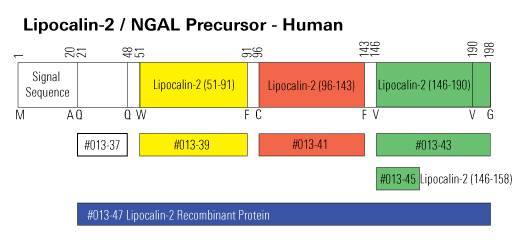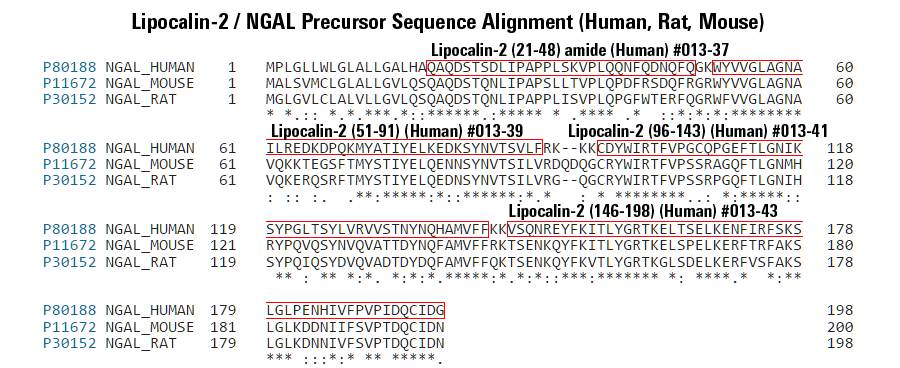

Bone has recently emerged as a pleiotropic endocrine organ that secretes at least two hormones, FGF23 and osteocalcin, which regulate kidney function and glucose homeostasis, respectively. These findings have raised the question of whether other bone-derived hormones exist and what their potential functions are. Here we identify, through molecular and genetic analyses in mice, lipocalin 2 (LCN2) as an osteoblast-enriched, secreted protein. Loss- and gain-of-function experiments in mice demonstrate that osteoblast-derived LCN2 maintains glucose homeostasis by inducing insulin secretion and improves glucose tolerance and insulin sensitivity. In addition, osteoblast-derived LCN2 inhibits food intake. LCN2 crosses the blood-brain barrier, binds to the melanocortin 4 receptor (MC4R) in the paraventricular and ventromedial neurons of the hypothalamus and activates an MC4R-dependent anorexigenic (appetite-suppressing) pathway. These results identify LCN2 as a bone-derived hormone with metabolic regulatory effects, which suppresses appetite in a MC4R-dependent manner, and show that the control of appetite is an endocrine function of bone.
Mosialou I, Shikhel S, Liu JM, et al. Nature. 2017;543(7645):385-390.
Co-existing depression worsens Alzheimer's disease (AD) pathology. Neutrophil gelatinase-associated lipocalin (NGAL) is a newly identified (neuro)inflammatory mediator in the pathophysiologies of both AD and depression. This study aimed to compare NGAL levels in healthy controls, AD without depression (AD-D), and AD with co-existing depression (AD+D) patients. Protein levels of NGAL and its receptors, 24p3R and megalin, were assessed in nine brain regions from healthy controls (n?=?19), AD-D (n?=?19), and AD+D (n?=?21) patients. NGAL levels in AD-D patients were significantly increased in brain regions commonly associated with AD. In the hippocampus, NGAL levels were even further increased in AD+D subjects. Unexpectedly, NGAL levels in the prefrontal cortex of AD+D patients were comparable to those in controls. Megalin levels were increased in BA11 and amygdala of AD+D patients, while no changes in 24p3R were detected. These findings indicate significant differences in neuroimmunological regulation between AD patients with and without co-existing depression. Considering its known effects, elevated NGAL levels might actively promote neuropathological processes in AD with and without depression.
Dekens DW, Naudé PJ, Engelborghs S, et al. J Alzheimers Dis. 2017;55(2):763-776.
Lipocalin-2 (LCN2) is a secreted adipokine that transports small hydrophobic molecules such as fatty acids and steroids. LCN2 limits bacterial growth by sequestering iron-containing siderophores and in mammalian liver protects against inflammation, infection, injury and other stressors. Because LCN2 modulates hepatic fat metabolism and homeostasis, we performed a comparative profiling of proteins and lipids of wild type (WT) and Lcn2-deficient mice fed either standard chow or a methionine- and choline-deficient (MCD) diet. Label-free proteomics and 2D-DIGE protein expression profiling revealed differential expression of BRIT1/MCPH1, FABP5, HMGB1, HBB2, and L-FABP, results confirmed by Western blotting. Gene ontology enrichment analysis identified enrichment for genes associated with mitochondrial membrane permeabilization and metabolic processes involving carboxylic acid. Measurements of mitochondrial membrane potential, mitochondrial chelatable iron pool, intracellular lipid peroxidation, and peroxisome numbers in primary hepatocytes confirmed that LCN2 regulates mitochondrial and peroxisomal integrity. Matrix-Assisted Laser Desorption/Ionization Time-Of-Flight (MALDI-TOF) mass spectrometry imaging identified significant changes to sphingomyelins, triglycerides, and glycerophospholipids in livers of mice fed an MCD diet regardless of LCN2 status. However, two arachidonic acid-containing glycerophospholipids were increased in Lcn2-deficient livers. Thus, LCN2 influences peroxisomal and mitochondrial biology in the liver to maintain triglyceride balance, handle oxidative stress, and control apoptosis.
Asimakopoulou A, Fülöp A, Borkham-kamphorst E, et al. Biochim Biophys Acta. 2017;
In the adult mammalian brain, newborn granule cells are continuously integrated into hippocampal circuits, and the fine-tuning of this process is important for hippocampal function. Thus, the identification of factors that control adult neural stem cells (NSCs) maintenance, differentiation and integration is essential. Here we show that the deletion of the iron trafficking protein lipocalin-2 (LCN2) induces deficits in NSCs proliferation and commitment, with impact on the hippocampal-dependent contextual fear discriminative task. Mice deficient in LCN2 present an increase in the NSCs population, as a consequence of a G0/G1 cell cycle arrest induced by increased endogenous oxidative stress. Of notice, supplementation with the iron-chelating agent deferoxamine rescues NSCs oxidative stress, promotes cell cycle progression and improves contextual fear conditioning. LCN2 is, therefore, a novel key modulator of neurogenesis that, through iron, controls NSCs cell cycle progression and death, self-renewal, proliferation and differentiation and, ultimately, hippocampal function.
Ferreira AC, Santos T, Sampaio-marques B, et al. Mol Psychiatry. 2017;
| Catalog# | Product | Standard Size | Price |
|---|---|---|---|
| 013-45 | Lipocalin-2 (146-158) amide / NGAL (146-158) amide (Human) | 200 µg | $186 |
| 013-43 | Lipocalin-2 (146-198) / NGAL (146-198) (Human) | 100 µg | $399 |
| 013-44 | Lipocalin-2 (161-198) / NGAL (161-198) (Human) | 100 µg | $373 |
| 013-37 | Lipocalin-2 (21-48) amide / NGAL (21-48) amide (Human) | 100 µg | $312 |
| 013-39 | Lipocalin-2 (51-91) / NGAL (51-91) (Human) | 100 µg | $349 |
| 013-41 | Lipocalin-2 (96-143) / NGAL (96-143) (Human) | 100 µg | $373 |
| 013-47 | Lipocalin-2 / NGAL, recombinant (Human) | 10 µg | $430 |
| EK-013-47 | Lipocalin-2 / NGAL, recombinant (Human) - ELISA Kit | 96 Wells | $474 |
Social Network Confirmation